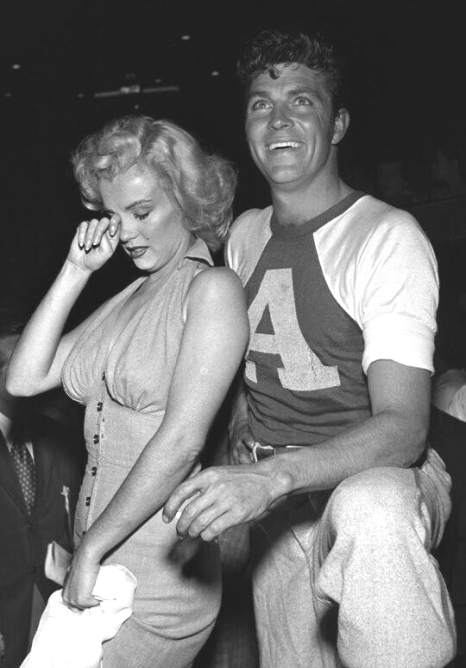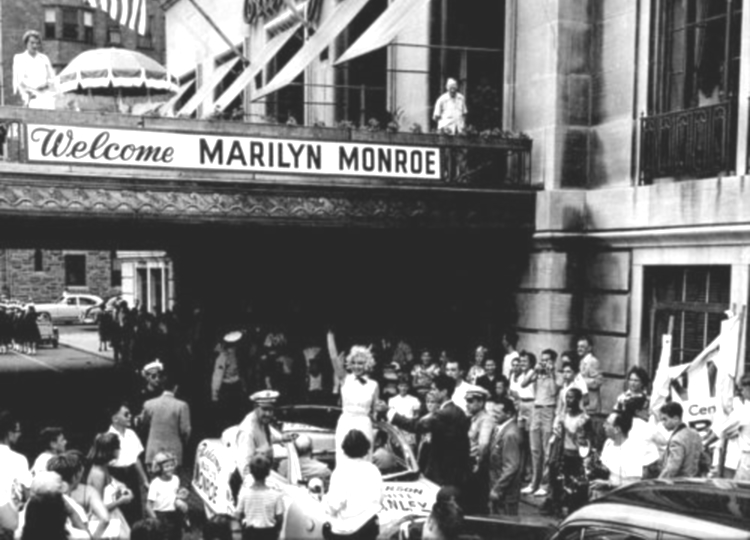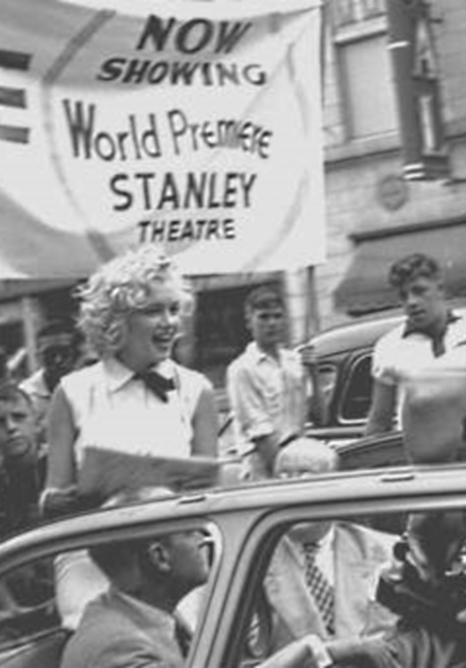Robert Kennedy the Younger
Apparently Robert and John Kennedy were similar in more than a few respects; but the testimony regarding the similarities Robert shared with John and his relationship with his older brother has been conflicting and contradictory. Likewise, testimony about Robert’s sexual proclivities, and his character as well, testimony tendered by friends and acquaintances and reported by Robert’s biographers, has also been conflicting and contradictory. The testifiers quoted by the biographers agreed that Robert admired his older brother, protected him, and in several respects was like John; but those same testifiers also insisted that the middle Kennedy brothers were not identical twins.
In the foreword to his biography about the younger brother, Camelot historian and friend, Arthur M. Schlesinger, Jr. proclaimed that John and Robert Kennedy were extremely close but displayed differing personalities: the former was objectively analytical while the latter was subjectively emotional; the former was frequently cheerful while the latter was often gloomy. Schlesinger asserted in summary that the older brother, the realist, wore the false countenance and guise of a romantic while the younger brother, who wore the false countenance and guise of the realist, was actually the romantic.1Arthur Schlesinger, Jr.: Robert Kennedy and His Times. The assessment can be found in: “Foreword to the 2002 Edition”.
Even though Schlesinger avoided any editorial commentary regarding the sexual proclivities of the feigned realist, other biographers did not. Several asserted that the attorney general, unlike the president, was not inclined to philandering or having extramarital affairs, not even with the world’s symbol of free and easy sex. Still, some biographers have reported testimony which suggested that Robert Kennedy was just as promiscuous as John but much more ruthless, downright hard and cold, in fact, even despicable. Those biographers contended and explained that the overly sensitive and self-acknowledged ungainly runt of the Kennedy boys underwent two significant transformations during his life, one political, one sexual.
Briefly during his early political career, Robert Kennedy worked for Joseph McCarthy, also known affectionately as Low Blow Joe, a tenure that engendered what some biographers have termed Bobby’s political confusion. Allegedly, the young and inexperienced Bobby embraced the anti-Communist, anti-leftist sentiments of that now infamous Wisconsin Republican Senator, sentiments that were prevalent during the late forties, the decade of the fifties and part of the sixties. The young attorney openly expressed contempt for liberals and their attitudes; however, Kennedy’s defenders have maintained that Bobby was always a good and sympathetic progressive who abhorred and actually rejected the Wisconsin Senator’s politics ruthless tactics. He only worked for McCarthy because he was forced into the job by Joe, Sr., the demanding patriarch of the Kennedy clan. Schlesinger believed that a tempered, protective shell developed around Robert Kennedy while his true personality retained an internal tenderness, the result of a determination to win the affections of his tough, demanding father.
Robert Kennedy appeared on the public scene and McCarthy’s committee as a didactic and pugnacious fellow who often fell into verbal fisticuffs,2Op. Cit. Schlesingeruncharacteristic posturing, according to Schlesinger, assumed by Robert to display and prove a lack of fear and a willingness to engage in battle, posturing designed to display and prove his toughness; but over time, the maturing and softening Robert formally rejected Low Blow Joe’s philosophy while shape shifting into an archetypal liberal politician and a staunch Democrat from the Kennedy clan. After leaving McCarthy’s investigative committee, Robert resumed his role as the Democratic Party’s counsel and authored the minority report condemning McCarthy’s investigation of the army.3Op. Cit. Schlesinger
Similarly, the young Bobby was diffident and shy, slightly withdrawn and expressed concern that he lacked the usual Kennedy masculinity, the usual Kennedy charm and magnetic effect on females; but as he aged, some asserted, he transformed into a womanizing scoundrel just like his older brother. What was the main difference between John and Robert’s pursuit of females? Robert was much more discreet than John; Robert selected his paramours with considerable care. Still, testimony regarding a man who some described as puritanical and sanctimonious, and his propensity to engage in extramarital affairs, has also been conflicting and contradictory.
After John Kennedy realized his conquest of Marilyn, virtually all the conspiracists have posited that he immediately tired of her, as was his propensity; but he could not easily deter Marilyn from her mission to become First Lady. According to one version of the legend, John simply passed off yet another discarded lover to his younger brother for what we in the South have a lurid and vulgar but nonetheless descriptive phrase. According to another version of the legend, John Kennedy dispatched his younger brother and his protector to merely explain the situation to a rejected and distraught lover. Robert’s mission was simply to pry John free, convince Marilyn that she and the president had no future together; but the younger brother unexpectedly fell for Marilyn’s allure and her sexuality, fell hard for America’s sexual sweet. Marilyn then fell out of love with the brother who had discarded her and immediately fell in love with the discarder’s messenger, a man who could also transform her into the First Lady. Robert Kennedy then promised to divorce his wife, forsake his religious beliefs, leave his flock of offspring, which numbered seven at that time, a number that would eventually grow to eleven, and wed the world’s most famous movie star. Many persons accept the preceding incredible scenarios while many also dismiss them as nothing but silly bunkum.
Richard Goodwin, assistant special counsel to John Kennedy and director of Robert Kennedy’s later campaigns for public office, reported to biographer Donald Spoto that the attorney general never mentioned Marilyn during their not only frequent talks but frequently intimate talks. Additionally, according to Goodwin, considering the younger brother’s relationship to his older brother, it would have been unthinkable for him to “take over” the relationship, [with Marilyn] as some have claimed (Spoto 493). Goodwin also asserted that the attorney general, unlike the president, was temperamentally disinclined to philander or engage in extramarital activities, even with the beautiful and sexy Marilyn Monroe. A fellow could advance the argument, then, that having an affair with a man disinclined to do so would have been virtually impossible, even for the one and only Miss Monroe.
However, for his biography, Bobby Kennedy: The Making of a Liberal Icon, Larry Tye interviewed Goodwin, and apparently Goodwin reversed himself; Goodwin informed Tye that Robert Kennedy engaged in what amounted to a tradition with Kennedy men. The attorney general was not as random or indiscreet as John or even Teddy Kennedy: Robert was more discriminate and controlled but he availed himself of women. Diane White-Crane, who worked for Robert Kennedy during his senatorial and presidential campaigns and was also a friend of Mary Jo Kopechne, reported to Tye, recalling the Chappaquiddick tragedy to illustrate, that Robert and brother Teddy were dissimilar at least in one respect. Diane was certain that Bobby would have gone out with Mary Jo. The distinguishing difference, however, was that Robert Kennedy would have drowned himself while trying to free Mary Jo from the submerged automobile. Apparently, then, Robert Kennedy was equipped with a human heart, although some of his detractors have asserted otherwise.
Edwin Guthman was Robert Kennedy’s close friend and confidant during the latter’s tenure as his older brother’s protector and attorney general. He was also the Special Assistant for Public Information in the Kennedy administration, senior press officer for the Justice Department under Robert Kennedy and a Pulitzer Prize winning investigative journalist. According to Guthman there was never even the slightest hint of an affair with Marilyn or any other woman for that matter. Robert Kennedy’s wife, Ethel, was the only woman in his life; and the attorney general was disinterested in any other woman beyond the congenial and graciously acceptable way of social encounters between the sexes. Engaging in an extramarital relationship, Guthman informed Spoto, would have been incredibly uncharacteristic for Robert Kennedy.
Gwen Gibson, however, a reporter for the Washington bureau of the New York Daily News, reported to Larry Tye that Robert Kennedy was certainly aware of beautiful women, just like all the hyper-sexed Kennedy men; and just like their father, his sons were flirts. John Anderson, an attorney who worked for Robert Kennedy’s presidential campaign, reported to Larry Tye that he, Anderson, observed the presidential candidate seated with the actress Candice Bergen in the forward section of a campaign airplane where the famous duo engaged in what Anderson described as smooching and nuzzling.
So, what can be made of the preceding testimony and contradictions contained therein, if anything? Being a flirt is one thing, while being an obsessed womanizer is something altogether and totally different. Occasionally engaging in a flirtatious moment with a pretty woman or smooching with Candice Bergen is not necessarily evidence or proof of anything, except, perhaps, a healthy male appreciation for beautiful women, resulting in a moment of weakness.
Larry Tye assumed an attitude of skepticism regarding Robert Kennedy’s purported dalliances, the questions regarding his faithlessness and his propensity to engage in extramarital activities, noting that many books had been written about the senator’s alleged dalliances and his alleged mistresses, a partial list of which included Lee Remick and Kim Novak, Candice Bergen and the singer Claudine Longet; but of course, the biographer asserted: No family in American history has been subject to more gossip, hearsay, and embellishment about their private affairs than the Kennedys (Tye 231).
Regarding Robert’s alleged romance with America’s most exotic and glamorous cinema actress, Tye observed that the colorful conjecturing about that alleged romance had been the result of questionable accounts that were hearsay or accounts based on questionable tape recordings which had miraculously disappeared. Tye assumed the only intellectually honest, logical and fair position regarding Robert Kennedy and his sexual proclivities: unless the testifier or the story teller had been present behind the closed doors, he or she could not testify to facts: they could only offer speculation. Tye correctly noted that the FBI and Hoover diligently raked for muck and dirt, searched for conclusive evidence proving Robert Kennedy’s adulterous relationships; but, as Tye explained, the FBI’s reports involving Robert Kennedy simply reiterated outrageous rumors heard on wiretapped and bugged conversations of mobsters, which the attorney general easily discredited and disproved.
Finally, Arthur Schlesinger, Jr. believed that Robert Kennedy’s audacity and his directness allowed him to approach and even comprehend Marilyn Monroe. Schlesinger attended the Krim’s after party on the night Marilyn sang “Happy Birthday to You” for John Kennedy; and he quoted Adlai Stevenson’s recollection of his encounter with the beautiful Marilyn that night, when she was adorned by what she called her skin and beads, an adornment which, Stevenson asserted, he never saw. Stevenson also recalled that he had to overcome the antics of Robert Kennedy who, like a moth drawn to Marilyn’s flame, was fluttering around her. Schlesinger echoed Stevenson’s sentiment. He had never seen a woman quite as beautiful; and he was also enchanted by her penetrating wit and demeanor. Then, after he and Robert Kennedy engaged in a faux contest for Marilyn’s attention, she faded into a glittering mist; but even so, Schlesinger observed, Marilyn was enchanting while also transmitting an odd desperation. Still, the curious and sympathetic Robert Kennedy, who usually responded directly to distress, and distress in any person, penetrated that mist, perhaps as very few could. The biographer afforded no credence to the conspiratorial theory that Robert and Marilyn were lovers or that the attorney general was somehow involved in Marilyn’s tragic death. That event, Schlesinger opined, was more than likely accidental but possibly intentional (Schlesinger 590-591).
While several friends, acquaintances and biographers delineated a Robert Kennedy who resembled Mr. Hyde, the majority of those who actually knew the attorney general delineated a man who more closely resembled Dr. Jekyll, one who cared about all people and one who was available to provide a sympathetic ear for virtually any person in distress. It appears that Robert Kennedy functioned as a sympathetic ear for Marilyn as well, once they actually met that is.
During the decades following the death of Marilyn Monroe and the assassinations of the middle Kennedy brothers, dubious testimony, rumors and innuendo suggesting that Marilyn, the sitting president and his attorney general brother met for clandestine meetings have appeared in virtually every conspiratorial Marilyn biography written since Frank Capell’s banal year of 1964; and the meeting’s locations have been many and varied: hotels in Manhattan and Lake Tahoe, Frank Sinatra’s various residences, Cabo San Lucas, Air Force One and the White House. It would not have been a shock to read that the lovers met once or twice in Fletcher’s neighborhood tree house. Testifiers to rumors of group sex and orgies and 8mm films of Marilyn and the Kennedys engaging in wild sexual gymnastics have appeared regularly during the past six plus decades. Virtually all of the testimony arrived second, third and even fourth hand from the friends of friends who claimed to be Marilyn’s friend or claimed to know one of Marilyn’s physicians or claimed to know Marilyn’s dentist, who knew all the lurid details about her affairs with assassinated American royalty in the form of politicians.
To the preceding group of testifiers, add the widows of deceased pilots and the widows of various men associated with the movies. The pilot’s widows repeated the alleged stories of their deceased husbands who allegedly flew Marilyn here there and everywhere. Sometimes she flew alone with John, sometimes alone with Bobby, sometimes alone with both and sometimes just alone; but she flew nonetheless to various and sundry places for her assignations with each. The movie mogul’s widows repeated the stories of their deceased husbands who claimed to have known Marilyn and knew all about her torrid affairs with John and Robert Kennedy. Those dark, dim and murky testimonies regarding undated clandestine meetings.
Marilyn Monroe along with John and Robert Kennedy were the most famous and recognizable persons of their generation. To arrange a clandestine tryst between those famous individuals would not have been impossible, of course, but virtually so. Imagine for a moment the difficulty any president or attorney general would have going anywhere unnoticed or traveling anywhere without a Secret Service detail for protection; but additionally, into that situation, factor that both the president and the attorney general were members of America’s reigning Royal Family, then the difficulties traveling incognito would certainly have been magnified.
Similarly, clandestine travel for Marilyn was also difficult. She had to wear a disguise, assume a pseudonym like Zelda Zonk and then ensconce herself in the rear of an airplane’s coach section; and frequently those tactics were not adequate enough to fool the press, who followed her every move with a near religious fervor. So, then, how when and where did Marilyn Monroe meet John Fitzgerald and Robert Francis Kennedy?


